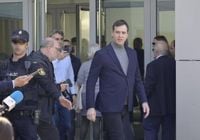On April 25, 2025, David Sánchez, the brother of Spanish Prime Minister Pedro Sánchez, faced a judge in Badajoz regarding allegations of influence peddling and prevarication connected to his appointment as director of the Office of Performing Arts at the Diputación de Badajoz. The investigation has drawn significant public attention, given the political implications and the nature of the accusations.
David Sánchez arrived at the courthouse shortly before 9:30 AM, dressed in a suit and turtleneck, and was met with vocal protests from demonstrators who labeled him a "scoundrel" as he entered the building. His statement before Judge Beatriz Biedma lasted for over an hour. Upon his exit, he declined to answer media questions, once again facing jeers from protesters.
The day's proceedings also included testimonies from several key figures involved in the case, including Luis Carrero, an advisor to Moncloa, who is also under scrutiny for his hiring by Sánchez. Additionally, Cristina de Frutos, a conductor who applied for the same position that Sánchez ultimately secured, testified about alleged irregularities during the selection process.
De Frutos claimed that prior to her interview, she was informed by a colleague that the position was already earmarked for David Sánchez. "I was told that the position was given to him before the interviews took place," she asserted. She emphasized the lack of equal opportunity during the interview process, stating that she was not asked any questions, whereas Sánchez was. This discrepancy has raised eyebrows and fueled accusations of nepotism.
In her statement, De Frutos revealed that an acquaintance, Antonio Luis Suárez, had sent her a WhatsApp message warning her that Sánchez was the favored candidate. However, Suárez later contested her interpretation, asserting that he merely suggested Sánchez's international profile made him a strong contender, not that the position was guaranteed to him.
Judge Biedma pressed De Frutos on whether anyone had informed her that the position was predetermined for Sánchez. She reiterated that Suárez had mentioned it but could not recall if he disclosed his source of information.
As the investigation unfolds, the implications for the Sánchez family and the broader political landscape remain significant. David Sánchez has been accused of leveraging his influence to secure the position for Carrero, who had previously assisted him with the Ópera Joven project. Both men acknowledged their long-standing friendship during their testimonies but denied any wrongdoing.
On the same day, Ricardo Cabezas, the current deputy of Culture and secretary of the PSOE in Badajoz, also provided testimony regarding the hiring of Carrero. He assured the media that he had answered all questions regarding the hiring practices within the Diputación.
The investigation has sparked intense scrutiny, with accusations of favoritism and corruption swirling around the Sánchez family. The court proceedings have drawn a crowd of journalists and protesters, highlighting the public's interest in the case and the political ramifications it may have.
Moreover, the prosecutor's office has come under fire for allegedly ignoring De Frutos's complaint about the pre-awarded position for several months. This revelation has raised questions about the integrity of the investigation and whether proper procedures were followed.
As the case progresses, the focus will remain on the testimonies of those involved and the evidence presented. The outcome could have far-reaching consequences for the Sánchez family and the PSOE, particularly as allegations of nepotism continue to emerge.
In a statement to the press, De Frutos expressed her frustration at the lack of transparency in the hiring process, stating, "I believe that there was no equality of opportunity, and it was clear that the position was meant for David Sánchez from the beginning." Her remarks reflect a growing sentiment among those who feel that the political elite are shielded from accountability.
As the court prepares for further hearings, observers will be keen to see how the judge navigates the complexities of this case, balancing the need for justice with the potential political fallout. The ramifications of this investigation could resonate throughout Spanish politics, particularly as it shines a light on issues of transparency and fairness in public appointments.
In conclusion, the case of David Sánchez raises critical questions about the intersection of politics and personal relationships within government institutions. As the investigation continues, it remains to be seen whether justice will be served and what impact it will have on the Sánchez family's political future.






